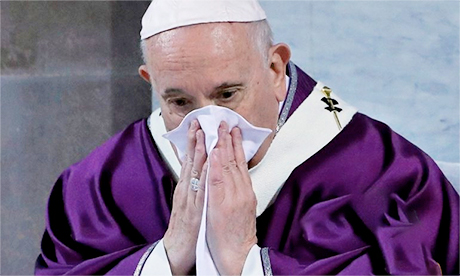Coronavirus fever has hit the press, with outright statements that Pope Francis has the COVID-19 strain of the virus.
Francis, who has been coughing during several recent appearances, cancelled public events and his attendance at a week-long spiritual retreat to mark the start of each Lenten season.
The Vatican has confirmed, however, that the pope has been tested and does not have coronavirus.
However, Europe begins to reel under the threat of the Coronavirus.
Two people tested positive to the virus in Rome in January, but there have been no reported cases since then.
In Italy, 3,000 people are confirmed as having the virus and 107 have died. Most of the cases so far have been in the northern part of the country.
In Lombardy and Venice, 50,000 people are quarantined and numerous parishes and dioceses have cancelled public Masses and Lenten services.
Several US Catholic universities are recalling students who are currently studying in Rome.
Many of these universities have a policy to bring staff and students home when a country reaches level three of the Centers for Disease Control and Prevention risk factor chart. Italy reached level three last Friday.
In Switzerland, the first Catholic Mass to be celebrated in Geneva’s St. Peter’s Cathedral since the Reformation has been postponed until May.
In France, there have been 130 confirmed cases and two deaths.
One of those infected is a priest who recently returned from France’s national church in Rome.
On Friday last week the French Embassy to the Holy See quarantined the church’s 24 resident French priests.
On Monday, however, the Embassy said “any risk of possible contagion by the priest” had been ruled out and the precautionary measures had been revoked.
In France, where the Louvre has been closed and the government has banned indoor gatherings of over 5,000 people, Archbishop Michel Aupetit of Paris has told priests not to distribute the Eucharist on the tongue and to empty their church’s holy water fonts.
The French Shrine of Our Lady of Lourdes is still welcoming pilgrims but the healing pools the sick bathe in are closed.
Speaking in relation to the measures to keep the virus at bay in Rome, a woman who spends most of her days taking groups through packed museums, says the reaction “seems extreme.”
“While liability issues and worry of quarantine make sense, I wonder about the wisdom of frightening people into isolating themselves,” she said.
If society falls into “social and financial free fall for flu-like symptoms, what happens one day if the threat is truly serious?” she wonders.
Source
Additional readingNews category: World.




